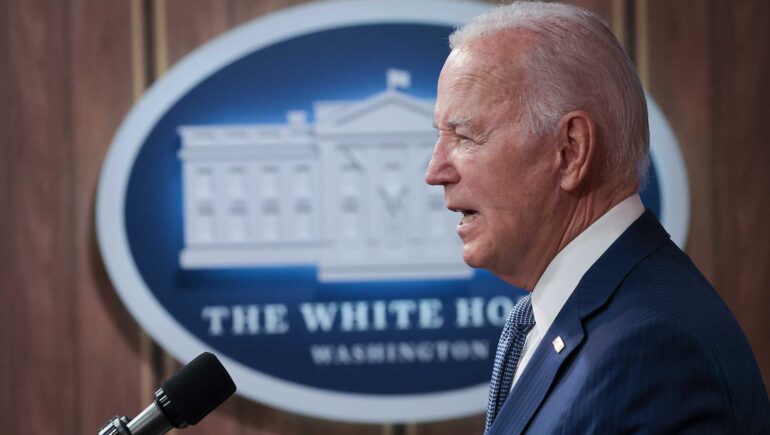TL;DR:
- Biden administration issues executive order limiting US tech investment in Chinese technology.
- Restrictions target sectors like semiconductors, quantum computing, and AI due to national security concerns.
- US investors are already retreating from China due to economic challenges and geopolitical tensions.
- House Committee expresses concern about US venture firms’ investments in Chinese tech startups.
- Sequoia Capital restructures international operations, highlighting industry response.
- White House is concerned about technologies enhancing China’s military and surveillance capabilities.
- Analysts predict ban’s expansion, deterring investments even beyond the prohibited sectors.
- Some hedge funds continue assessing China investment despite geopolitical risks.
- Shift poses challenges: investment capital around China may seek new opportunities.
- Existing investments, like ByteDance, face uncertainties due to a potential US ban.
- Improving US-China relations could disadvantage firms without prior China presence.
- Rebuilding trust crucial for firms aiming to benefit from potential future openings.
Main AI News:
The recent executive order issued by the Biden administration, which places limitations on private equity and venture capital investments in Chinese technology, has ushered in a new era for US tech investors. This landmark ruling underscores the escalating cross-Pacific rivalry and firmly underscores the notion that the world’s second-largest economy is now off-limits for these investors.
The directive, specifically aimed at curbing investments in sectors such as semiconductors, quantum computing, and artificial intelligence, is driven by concerns over China’s advancements in these areas potentially conflicting with US national security interests. This significant policy shift is slated to take effect in the coming year.
The investment landscape has already seen US investors steadily retreat from China due to a combination of economic challenges and geopolitical tensions. Notably, data from PitchBook reveals that combined US private equity and venture investments in China reached an eight-year nadir in 2022 in terms of capital deployed, a trend that has persisted into the first half of this current year.
Elena McGovern, co-head of the national security practice at private equity advisory firm Capstone, noted, “We’ve had conversations with our own clients who have said, ‘Yeah, look, we’ve really been pulling back on our presence in China for a little while… This is the first time that the US government is imposing restrictions on how US capital flows out of the country, how US investors are making investment decisions. So that is a new era.”
The pressure exerted by these restrictions transcends political boundaries. In a bipartisan move, the House Select Committee on the Chinese Communist Party reached out to four US venture firms, expressing “serious concern” about their investments in Chinese tech startups. Moreover, Sequoia Capital, a venerable VC firm, announced its plan to divide its international operations into three segments, with Neil Shen leading its formidable Sequoia China unit.
The scope of concern for the White House extends to any technology that might bolster China’s military capabilities or surveillance prowess. Eric Reiner, managing partner at Vine Ventures, stressed, “US money should not be used to finance Beijing’s military development… A lot of these firms that have been investing in China and setting up offices there are really playing with fire.”
While the executive order singles out AI, computer processors, and quantum computing, many investors and experts believe the ban’s ambit will likely widen, rendering any involvement in Chinese technology too perilous to pursue. Adam Hickey, a former deputy assistant attorney general for the Justice Department’s national security division and now a partner at law firm Mayer Brown, cautioned, “It’s likely to deter investments in those sectors, even beyond what is explicitly prohibited… Most investors want to avoid being seen as acting against US national security interests.”
Steve Sarracino, the founder of Activant Capital, observed, “I don’t know anyone that’s doing early-stage China investing from the US.. hedge funds, who really are in the business of calculating geopolitical risks.” The exceptions seem to be hedge funds, with Activant’s offices spanning the US, Germany, and South Africa.
However, this US government stance against China also carries its own set of risks. There’s a substantial pool of investment capital around China that could step in to fill the void, potentially yielding substantial returns. Furthermore, there’s the ongoing challenge of managing existing investments.
Consider the case of major US venture firms that have invested in ByteDance, the parent company of TikTok. The threat of a potential US ban or a forced sale to sustain operations has loomed over ByteDance. Investors are keen on maximizing returns, especially if ByteDance goes public. But the company’s reported decision to halt a planned US listing in 2021 due to security concerns complicates matters. In the same year, China clamped down on domestic firms trading on US exchanges. With tech IPO markets largely constrained and US-China tensions intensifying, the realization of gains for ByteDance investors remains uncertain.
Other investors voice concerns that if relations between the two countries improve, US firms may face difficulties accessing favorable deals. Rebuilding trust in such a scenario is poised to be a considerable challenge. Sarracino noted, “If you already had a presence there, you will have an advantage when things open up… But that’s not the case for firms that weren’t in China or those that pared back their operations in the country.”
Conclusion:
This pivotal moment, marked by the Biden administration’s executive order restricting tech investments in China, signals a significant shift in the market landscape. The limitations, primarily targeting critical sectors for China’s technological advancement, are likely to further discourage US investors from engaging with Chinese technology. The escalating cross-Pacific rivalry and national security concerns have prompted investors to reassess their strategies, potentially reshaping the competitive dynamics in the tech investment landscape.

